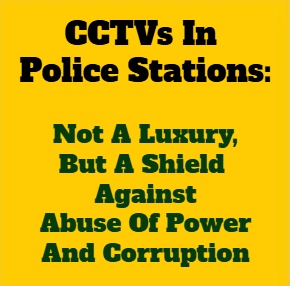

By Sunil Garodia
First publised on 2025-09-06 03:25:19
Supreme Court Steps In Yet Again
The Supreme Court's decision to step in on custodial deaths in Rajasthan - sparked by a scathing Dainik Bhaskar report - should shame every senior cop and policymaker in the country. Once again, the top court has to do the job of enforcing what should be basic decency and administrative discipline. Its order to file a PIL on non-functional CCTVs in police stations is not just a legal move - it is an indictment of a system that has looked the other way for far too long.
Police Stations Acting In Defiance
CCTVs in police stations are not some bureaucratic luxury. They are a basic shield against abuse of power. When the Supreme Court directed comprehensive surveillance, it was responding to decades of custodial torture and deaths that stain India's human rights record. Yet, years later, most police stations operate in open defiance, treating constitutional orders as if they were optional guidelines.
Intentional Acts To Escape Accountability
This is not oversight - it is defiance. Police departments that plead poverty while running fleets of cars and stocking modern weapons are not fooling anyone. Broken cameras and "technical glitches" do not happen by accident; they serve the interests of those who thrive in darkness, where accountability cannot reach. Every dead camera is a conscious choice to keep constitutional protections out of the interrogation room.
No Rule Of Law
The price of this contempt is human life. Custodial deaths in India are not freak incidents; they are predictable outcomes of a culture that sees suspects as guilty first and human later. In Rajasthan, as in all other states, police stations without functioning cameras create spaces where the right to life depends on the temperament of an officer - not the law.
Lack Of Political Will
This is about governance at its core. If Supreme Court orders can be ignored without consequence, what does that say about the rule of law? When governments can spend crores on political tamashas but claim they lack money to maintain CCTVs, their priorities are obvious. This is not about resources - it is about political will.
Police Lose Moral Authority
Maintaining CCTVs is not challenging. Such systems are cheap, durable, and easy to monitor remotely. Even housing societies and individual homes install and maintain them perfectly. The tools exist. The law is clear. The only thing missing is the will to be transparent. If they cannot maintain the CCTV systems in their own backyard, how will the police have the moral authority to force businesses like hotels, resorts and shops to install and maintain them?
Opposition To CCTV Not Due To Undermining Of Trust
The police unions that oppose surveillance often argue it undermines trust. That is dishonest. Police forces around the world work under cameras without losing effectiveness. Cameras only "hamper" activities that should not be happening in the first place. If cops are nervous about being watched, maybe it is the conduct - not the cameras - that needs scrutiny.
How Will The Court Ensure Enforcement?
The court's challenge now is enforcement. Past attempts at reporting and monitoring fizzled because states dragged their feet and filed half-baked updates. This time, the court has to bite down harder. Non-compliance should be treated as contempt, with senior officers personally answerable. States must set up monitoring cells with real power to suspend or penalize those who ignore the rules.
The System Must Respond Positively
The stakes go beyond custodial violence. If the system cannot keep surveillance running in its own buildings, how can it be trusted to handle complex investigations, protect witnesses, or safeguard evidence? Cameras in police stations are not just about checking abuse - they are about proving the system itself can be trusted.











